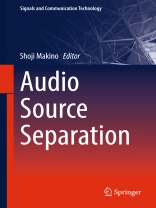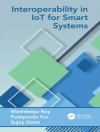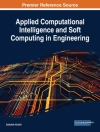This book provides the first comprehensive overview of the fascinating topic of audio source separation based on non-negative matrix factorization, deep neural networks, and sparse component analysis.
The first section of the book covers single channel source separation based on non-negative matrix factorization (NMF). After an introduction to the technique, two further chapters describe separation of known sources using non-negative spectrogram factorization, and temporal NMF models. In section two, NMF methods are extended to multi-channel source separation. Section three introduces deep neural network (DNN) techniques, with chapters on multichannel and single channel separation, and a further chapter on DNN based mask estimation for monaural speech separation. In section four, sparse component analysis (SCA) is discussed, with chapters on source separation using audio directional statistics modelling, multi-microphone MMSE-based techniques and diffusion map methods.
The book brings together leading researchers to provide tutorial-like and in-depth treatments on major audio source separation topics, with the objective of becoming the definitive source for a comprehensive, authoritative, and accessible treatment. This book is written for graduate students and researchers who are interested in audio source separation techniques based on NMF, DNN and SCA.
Tabella dei contenuti
Preface.- 1 Single Channel Audio Source Separation NMF; Cédric Févotte, Emmanuel Vincent, and Alexey Ozerov.- 2 Separation of known sources using non-negative spectrogram factorization; Tuomas Virtanen and Tom Barker.- 3 Dynamic Non-Negative models for audio source separation; Paris Smaragdis, Gautham Mysore, Nasser Mohammadiha.- 4 An introduction to multichannel NMF for audio source separation; Alexey Ozerov, Cédric Févotte and Emmanuel Vincent.- 5 General formulation of multichannel extensions of NMF variants; Hirokazu Kameoka, Hiroshi Sawada and Takuya Higuchi.- 6 Determined Blind Source Separation with Independent Low-Rank Matrix analysis; Daichi Kitamura, Nobutaka Ono, Hiroshi Sawada, Hirokazu Kameoka and Hiroshi Saruwatari.- 7 Deep neural network based multichannel audio source separation; Aditya Arie Nugraha, Antoine Liutkus and Emmanuel Vincent.- 8 Efficient Source separation using bitwise neural networks; Minje Kim and Paris Smaragdis.- 9 DNN based mase estimation for supervised speech separation; Jitong Chen and De Liang Wang.- 10 Informed spatial filtering based on constrained ICA; Hendrik Barfuss, Klaus Reindl and Walter Kellermann.- 11 Recent advances in multichannel source separation and denoising based on source sparseness; Nobutaka Ito, Shoko Araki, and Tomohiro Nakatani.- 12 Multimicrophone MMSE-based speech source separation; Shmulik Markovich-Golan, Isral Cohen and Sharon Gannot.- 13 Musical-Noise-Free blind speech extraction based on higher-order statistics analysis; Hiroshi Saruwatari and Ryoichi Miyazaki.- 14 Alternating diffusion maps for audio-visual source separation; David Dov, Ronen Talmon and Israel Cohen.- Index.
Circa l’autore
SHOJI MAKINO (F) received the B. E., M. E., and Ph.D. degrees from Tohoku University, Japan, in 1979, 1981, and 1993, respectively. He joined NTT in 1981. He is now a Professor at University of Tsukuba. His research interests include adaptive filtering technologies, realization of acoustic echo cancellation, blind source separation of convolutive mixtures of speech, and acoustic signal processing for speech and audio applications. Dr. Makino received the IEEE SPS Best Paper Award in 2014, the IEEE MLSP Competition Award in 2007, the ICA Unsupervised Learning Pioneer Award in 2006, the Commendation for Science and Technology of Japanese Government in 2015, the TELECOM System Technology Award in 2015 and 2004, the Achievement Award of the Institute of Electronics, Information, and Communication Engineers (IEICE) in 1997, and the Outstanding Technological Development Award of the Acoustical Society of Japan (ASJ) in 1995, the Paper Award of the IEICE in 2005 and 2002, the Paper Award of the ASJ in 2005 and 2002. He is the author or co-author of more than 200 articles in journals and conference proceedings and is responsible for more than 150 patents. He was a Keynote Speaker at ICA2007 and a Tutorial speaker at EMBC 2013, Interspeech 2011 and ICASSP 2007. Dr. Makino IEEE activities include: Member, SPS Technical Directions Board (2013-14), SPS Awards Board (2006-08), SPS Conference Board (2002-04), IEEE Jack S. Kilby Signal Processing Medal Committee (2015-), IEEE James L. Flanagan Speech & Audio Processing Award Committee (2008-11) and Member and Chair, SPS Audio and Electroacoustics Technical Committee (1993-09 and 2013-14, respectively); SPS Distinguished Lecturer (2009-10); Chair, Circuits and Systems Society Blind Signal Processing Technical Committee (2009-2010); Associate Editor, IEEE Transactions on Speech and Audio Processing (2002-05) and EURASIP Journal on Advances in Signal Processing (2005-2012). He was the Vice President, Engineering Sciences Society of the IEICE (2007-08) and Chair, Engineering Acoustics Technical Committee of the IEICE (2006-08). He is a Member, International IWAENC Standing committee and International ICA Steering Committee; General Chair, WASPAA2007 and IWAENC2003; Organizing Chair, ICA2003; and Plenary Chair, ICASSP2012. Dr. Makino is an IEEE Fellow, an IEICE Fellow, a Board member of the ASJ, and a member of EURASIP and ISCA.












